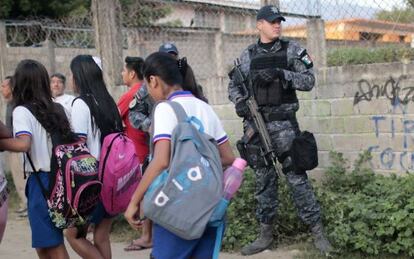Cartels target Acapulco’s classrooms for extortion schemes
Military posted outside schools after students and teachers refuse to attend classes

The teachers in Acapulco are about to be paid their annual Christmas bonuses, but local drug traffickers are waiting to get their cut.
In the past, criminal groups have mostly extorted money from taxi drivers, politicians and businessmen, and have left teachers alone. But this is now a thing of the past.
For months, the drug cartels have been focusing their extortion attempts on educators and students in the Pacific resort city that was made famous during the 1960s, when Hollywood stars and rich New York executives regularly flew in to soak up the sun and play in the sand.
Since Monday, the police and military have been guarding 120 schools
Since Monday, the police and military have been guarding 120 schools that have been targeted by cartel members.
Recently, armed gunmen entered the classrooms at 14 schools, and robbed and threatened all the students. Concerned about their safety, teachers stayed away from their classrooms for an entire month.
Guerrero, where Acapulco is the largest city, is the most violent state in Mexico.
In September 2014, 43 teaching school students from Ayotzinapa disappeared after they were arrested by a corrupt police force in nearby Iguala. They are all thought to have been executed by drug traffickers who later burned their bodies.
President Enrique Peña Nieto has ordered the federal government to continue investigating the case.
But despite the government’s attempts to control the rampant crime by sending in the military, the violence continues in Guerrero. Some weeks ago, authorities found a few common graves filled with bodies and days later, 12 people were executed by unknown gunmen.
Between January and September, 1,985 murders have taken place throughout the entire state.
At the beginning of the month, teachers began complaining about the threats they had been receiving from the extortionists. In 56 of the 1,150 primary and secondary schools in Acapulco, students refused to attend class.
“They said that they were not going to class because they had received threats while at the same time they were being visited inside the school by people who were demanding money – they were being extorted,” said the Guerrero state education minister, José Luis González de la Vega, in a telephone interview.
“The only way they wouldn’t be bothered was by not going to school,” the official said.
The only way they wouldn’t be bothered was by not going to school” Guerrero state education minister
Ramos Reyes Guerrero, a leader of the local CETEG education workers union, confirmed that “when December comes around [the traffickers] want their part of the bonus.”
Those that do complain have suffered the consequences. Five years ago, one instructor was pulled out of her school in the Renacimiento neighborhood – one of the biggest residential districts in Acapulco – and wasn’t released until her family paid a ransom.
In different incidents, one teacher was later shot in the head while an instructor was gunned down on the first day of classes.
A city that had once been a prime tourist destination has been crushed by rampant crime. The residents of the city’s outskirts, where the majority of hotel and resort workers live, suffer from poverty and discrimination.
English version by Martin Delfín.
Tu suscripción se está usando en otro dispositivo
¿Quieres añadir otro usuario a tu suscripción?
Si continúas leyendo en este dispositivo, no se podrá leer en el otro.
FlechaTu suscripción se está usando en otro dispositivo y solo puedes acceder a EL PAÍS desde un dispositivo a la vez.
Si quieres compartir tu cuenta, cambia tu suscripción a la modalidad Premium, así podrás añadir otro usuario. Cada uno accederá con su propia cuenta de email, lo que os permitirá personalizar vuestra experiencia en EL PAÍS.
En el caso de no saber quién está usando tu cuenta, te recomendamos cambiar tu contraseña aquí.
Si decides continuar compartiendo tu cuenta, este mensaje se mostrará en tu dispositivo y en el de la otra persona que está usando tu cuenta de forma indefinida, afectando a tu experiencia de lectura. Puedes consultar aquí los términos y condiciones de la suscripción digital.








































